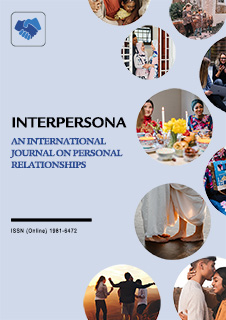Most Viewed Articles (last 30 Days)
-
Social Network Pressure on Women and Men to Enter a Romantic Relationship and Fear of Being SingleSusan Sprecher, Diane Felmlee1170
-
In-Laws, Communication, and Other Frustrations: The Challenges of Intercultural MarriagesAnthony T. Machette, Ioana A. Cionea799
-
The Dark Triad, Love Components, and Attachment Styles in Romantic Relationship Experiencing During Young AdulthoodRadka Čopková, Eva Lörincová424
-
Do Romantic Relationships Promote Happiness? Relationships’ Characteristics as Predictors of Subjective Well-BeingAmanda Londero-Santos, Jean Carlos Natividade, Terezinha Féres-Carneiro411
Description
Interpersona
An International Journal on Personal Relationships
Free of charge for authors and readers
Attention
New submissions will no longer be processed on this website, as Interpersona will move to a new publisher based in Brazil in the near future. As soon as the new journal website becomes available, submissions will reopen. Please bookmark this page for further information about when this will be possible.
Submitting a Revision
To upload a requested revision, please log into your author account and upload the revision to the "Revisions" section of the submission's "Review" page.

Interpersona is a peer-reviewed, semiannual (June and December), open access online journal on all kinds of human relationships, from weak ties to close relationships, and their relations with society and culture.
With an international Editorial Board the journal seeks to internationalize the investigation of human relationships. There is no charge for submitting or publishing in Interpersona.
Interpersona has published articles from all over the world, including Europe, North America, South and Central America, Asia, Oceania, and Africa. It was founded in 2007 to foster the internationalization of research on human relationships. In 2012, Interpersona changed to PsychOpen to improve the international visibility and exchange of information on relationship research. It is published by PsychOpen, Leibniz Institute for Psychology, Trier, Germany, on behalf of the Study group on Assessment, Therapy and Emotions (Grupo de estudos em Avaliação, Terapia e Emoções - GATE), Brazil.
Recent Articles
-
Love, Sex, Respect, and Physical Attractiveness in Marital Satisfaction and Remarriage: A Comparison Between Monogamous and Polygynous MarriagesWaqar Husain, Ammara Faheem, Aden ZaheerDecember 2024
-
Loneliness, Stigma, and the Tendency for Interpersonal Victimhood Inhibit Compassion for Some but Not All Suffering Social GroupsColter D. Ray, Ningyang Ocean Wang, Lindsay A. Duede, Ben Garza, Julien BurnsDecember 2024
-
The Relation Between Interpersonal Relationship Satisfaction and Spiritual Well-Being in AdultsHajira Batool, Sadia SaleemDecember 2024
-
Self-Compassion, Psychological Well-Being, and the Quality of Romantic Relationships: A Study With Malaysian Emerging AdultsHooi Ping Teoh, Intan H. M. Hashim, Suzanna Awang BonoJune 2024
-
Validation of Romantic Partner Conflict Scale (RPCS) in Pakistani Married Couples: Establishing Measurement InvarianceZaeema Farooq, Nasreen Akhtar, Tammy ZacchilliJune 2024

